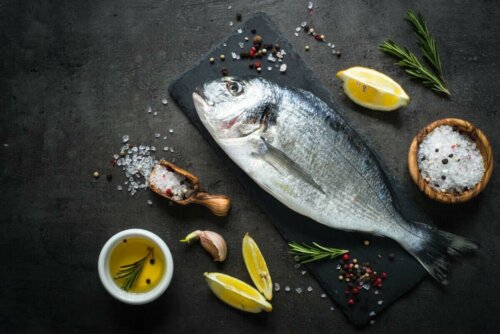What Should Pregnant Women Have for Dinner?


Written and verified by the nutritionist Anna Vilarrasa
Pregnant women, especially those in their third trimester, don’t look forward to coming home late and cooking or sitting at the table in front of a big meal. However, they should still eat at night, and, by this, we don’t mean that it’d be okay for them to eat the first thing they can get their hands on. What should pregnant women have for dinner, then?
On the contrary, one of the best things for them is maintaining a practical and healthy dinner routine, as this ensures a good diet both for themselves and for the baby. In this sense, how should a pregnancy-appropriate dinner be? Here are some tips.
The importance of a healthy diet during pregnancy
One of the first issues that worry future mothers has to do with the amounts of food they must consume. After all, pregnancy comes with a lot of tiredness, especially during the last two trimesters, so they need to consume foods that keep them energetic throughout the day. And while it’s not necessary to “eat for two”, it’s not the right time to go on a strict diet either.
As a general rule, women at this stage tend to have a lot of appetite throughout the whole day. For this reason, they shouldn’t force themselves to eat. Of course, in order to have a healthy pregnancy, it’s vital to keep in mind the requirements of some nutrients, such as vitamins, minerals, or proteins.
In this sense, a good strategy would be to avoid large meals. Instead, pregnant women should distribute their food intakes in several portions a day. This, additionally, ensures an optimal supply of nutrients. For this reason, it’s extremely important for pregnant women not to neglect dinner.
Read also: The importance of diet during pregnancy
What should pregnant women have for dinner?
There are many healthy foods that pregnant women can have for dinner. However, at a general level, this last meal should contain all the groups of nutrients that are required for a balanced diet.
This means that, under normal conditions and without any pathology that advises against it, the woman must consume fruits, vegetables, carbohydrates, proteins, and fats. In this way, they’re all distributed throughout the day and it’s easier to meet the nutritional needs of each one.
A good way to distribute them is to look at the “Harvard’s Healthy Eating Plate” method. It recommends distributing the intakes in the following way:
- At dinner, half of the food must be vegetables
- A quarter of the plate must be filled with protein, which can be of animal or vegetable origin
- The last serving must be of carbohydrates
- It’s also possible to accompany the meal with a source of healthy fats and fruit for dessert
What food can pregnant women have for dinner?
As previously mentioned, all the nutrient groups must be present at dinner. Of course, it’s still essential to choose healthy and suitable foods for this meal.

Fruits and vegetables
All are allowed during pregnancy. There are a large number of possibilities to introduce vegetables to this meal. However, boiled or in cream form would be the most appropriate at dinner time. As for fruits, physicians recommend to eat them ripe and avoid citrus fruits as they can cause acid reflux problems.
Carbohydrates
Whole grains are the priority here, be it rice, pasta, bread, couscous, among others. In them, you can find all the sorts of nutrients. Also, don’t forget about fiber – remember that their intake keeps you from suffering from gastrointestinal issues, which can be quite common during pregnancy.
Protein
The best sources of protein for the evening are white fish, small bluefish, white meat, or eggs. You may prepare them grilled or roasted in the oven. A tip here is to season them with olive oil so that they don’t cause heavy digestion.
If, on the other hand, you prefer vegetable protein, tofu or tempeh are your best bets. Remember that these proteins have many essential amino acids and are the greatest alternatives to animal protein.
Quality fats
When it comes to fats, the best choice is using extra virgin olive oil when preparing meals. You can also add some nuts, avocado, or olives. You just have to use moderate amounts as they can lengthen digestion.
Read also: What are the best fruits for digestion?

Other characteristics that pregnancy dinner should meet
We all know that some bothersome symptoms may appear during pregnancy. Most aren’t really serious but can last for several weeks. Fortunately, through good dietary guidelines, it’s possible to improve nausea, constipation, heartburn, and stomach reflux.
That being said, it’s important to apply a series of dietary tips at dinner time. Let’s see the most relevant ones:
- Avoid large meals and divide the daily intake into several servings a day.
- Eat dinner at least three hours before going to bed. This improves reflux and heartburn.
- Forget about sauces, strong cheeses, pastries, and dairy desserts. All of them require longer digestion which can worsen the above symptoms.
- Don’t consume spicy foods, citrus fruits, chocolate, or carbonated drinks at dinner, as they favor the appearance of heartburn and reflux.
- Opt for whole grains, legumes, fruits, and vegetables. They provide dietary fiber, which helps relieve constipation.
Varied and healthy foods pregnant women can have for dinner
By putting these dietary guidelines into practice, it’s possible to ensure an adequate intake of all the nutrients that are required both for the development of the fetus and for the mother’s health. However, the number one tip we always give is to consult with a nutrition professional since every single person is different and requires different things.
The nutritionist may suggest other adjustments or types of food according to the characteristics of each pregnant woman. For example, their age, their current state of health, the stage of pregnancy, among other things.
All cited sources were thoroughly reviewed by our team to ensure their quality, reliability, currency, and validity. The bibliography of this article was considered reliable and of academic or scientific accuracy.
- Butte N.F, et al. Energy requirements during pregnancy based on total energy expenditure and energy deposition. The American Journal of Clinical Nutrition. Junio 2004. 79(6):1078-87.
- Danielewicz H, et al.Diet in pregnancy-more than food. European Journal of Pediatrics. Noviembre 2017. 176(12):1573-1579.
- Frias Gomes C, et al. Gastrointestinal diseases during pregnancy: what does the gastroenterologist need to know?Annals of Gastroenterology. Julio 2018.31(4): 385–394.
- Institute of Medicine (US) Committee on Nutritional Status During Pregnancy and Lactation. Nutrition During Pregnancy: Part I Weight Gain: Part II Nutrient Supplements. Washington (DC): National Academies Press (US); 1990. 7, Energy Requirements, Energy Intake, and Associated Weight Gain during Pregnancy.
- Kominiarek MA, Rajan P. Nutrition Recommendations in Pregnancy and Lactation. Medical Clinics North America. Noviembre 2016. 100(6):1199-1215.
- NSW Food Authority. Food Safety During Pregnancy.
- Trottier M, et al. Treating constipation during pregnancy. Canadian Family Physician. Agosto 2012. 58(8):836-838.
- Institute of Medicine (US) Committee on Nutritional Status During Pregnancy and Lactation. Nutrition During Pregnancy: Part I Weight Gain: Part II Nutrient Supplements. Washington (DC): National Academies Press (US); 1990. 1, Summary. Available from: https://www.ncbi.nlm.nih.gov/books/NBK235235/
This text is provided for informational purposes only and does not replace consultation with a professional. If in doubt, consult your specialist.








